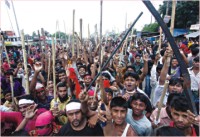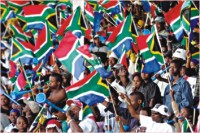
Inside
|
Editor's Note The month of fasting leading up to Eid-ul Fitr, a season routinely marked by garment workers raising demands for payment of arrear dues and the festival bonus passing off positively and peacefully, we are now confronted with the core issues affecting the garments sector. In the relative lull, a phase of introspection has set in among the stakeholders to come to grips with problem areas impeding realisation of the garment sector's full potential. We crave for seeing the process come to fruition and thus wish to facilitate it with all the inputs we are able to put together in this issue courtesy a select band of contributors. The sector is the largest foreign exchange earner and by far the biggest employer, particularly of women yielding considerable spin off dividends. It has remarkably succeeded in favourable international clime and survived through the bad patches in spite of inner contradictions and constraints to fetch sizable forex. The hiatus between the government-fixed minimum wage of Tk 3,000 per month and that of Tk 5,000 being demanded by workers and largely supported by experts is disturbingly wide. It will take a lot of doing to bridge the gap. Tk 5,000 a month is a barely subsistence or living wage. Yet the garment manufacturers and exporters dish out all sorts of calculations to justify their spurning the suggestion. Through lack of well researched data and analysis their contention that they will lose out on competitiveness amidst lowering of prices if they were to allow higher wages remains to be addressed and assailed. So the cry for reliable database is eminently justified. It will be a strategic move for banks to fund sick industries to resurrect because their workers tend to put a spanner on the works of the compliant and successful industries. Eventually, we may have to go for equity participation of the workers to give them a stake in the industries. The interregnum between the September issue and the current one coincides with a series of other concerns such as well being of the ageing, earthquake preparedness status, physically and mentally challenged people, getting the most out of private universities and multicuturalism in football affecting nationalism which should provide good read
|






